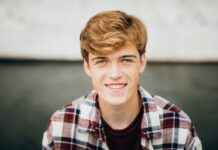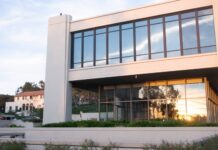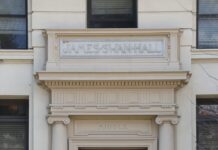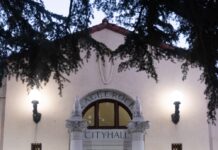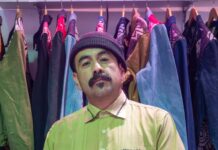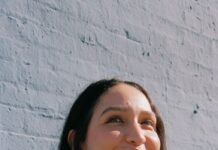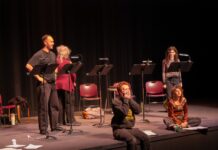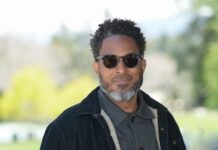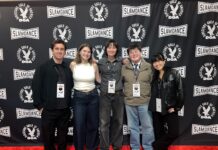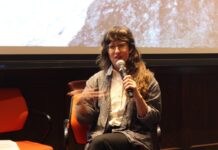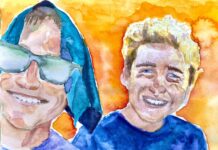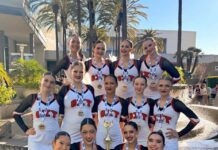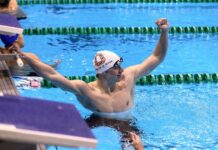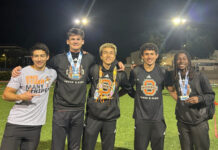First-year and sophomore students interested in pursuing science, technology, engineering and mathematics (STEM) majors will have the opportunity to apply for a new scholarship from the Creating Opportunities in Science and Mathematics for Occidental Students (COSMOS) program this spring.
Mathematics Professor Ron Buckmire led a team of Occidental faculty including Gretchen North, Carmel Levitan and Scott Bogue in successfully submitting a grant proposal to the National Science Foundation (NSF) for the scholarships and a related cultural studies program (CSP) class last spring.
According to Buckmire, 85 percent of the grant money must go directly to students. The remaining funds support a super-mentor program in which faculty advise STEM students throughout their college careers, as well as other activities for the select 24 recipients of the COSMOS scholarships.
“This is very unusual because generally in federal grants, there’s some fraction that actually goes to the college, as what’s called ‘overhead,’ and that can be as high as 50 percent,” Buckmire said.
The grant funding goes primarily toward scholarships to support academically-talented but financially-needy students in their pursuit of STEM degrees. According to the NSF website, the goal of the program is to contribute to the national effort of recruitment, retention and leadership development of STEM graduates.
From 2016–21, the COSMOS program will affect a total of three annual cohorts of eight first-year students, all of whom will receive $8,000 for each of their three remaining years at Occidental — ultimately giving over $500,000 in financial aid to 24 students. In all, the grant supports 64 individual scholarships, Buckmire said.
While the grant money will run out one year before the last group of eight graduates, the Admission and Financial Aid Office guaranteed that students will have the remaining $64,000 in their financial aid packages in 2021, according to Buckmire. Alternatively, the COSMOS faculty may renew the grant — a possibility that Buckmire said will be considered in a few years.
According to Levitan, the grant will first be applied to minimize work study awards so that students have more time to focus on academics and the freedom to pursue academic opportunities, such as research in faculty labs. Levitan said that the rest of the scholarship will be used to convert previously-awarded loans to grants.
The COSMOS application, available only to first-year students, will be open spring 2016 and the COSMOS faculty will choose the first cohort of scholars in summer 2016. In order to be eligible for the COSMOS program, students must complete three STEM courses in their first year and maintain at least a 3.0 GPA in those courses.
“The whole point of the program is to try to improve graduation rates of students who want to pursue STEM degrees,” Buckmire said.
Buckmire believes he had a leg up in developing a program that NSF would approve because he worked at the National Science Foundation when he was on leave from Occidental from 2011–13.
“I had a good idea of what we would need to do in order to get a successful proposal through,” Buckmire said.
According to Levitan, upon his return to Occidental, Buckmire gathered a group of faculty to meet in summer 2014 to discuss forming a team to apply for the NSF grant. Levitan, North and Bogue became the co-principle collaborators.
When COSMOS faculty applied for the grant, they also proposed to create the super-mentoring program and the CSP 96 class “Experiencing Mathematics and Science.”
In addition to student mentors, the COSMOS program also includes super-mentors. According to Buckmire, his team worked with staff in the registrar’s office and the advising center to assign trained volunteer faculty mentors to first generation students, financially needy students and students who are potentially underrepresented in STEM fields.
“Hopefully, those super-mentors will be more high-touch, be advisors who are more closely interacting with their first-year advisees,” Buckmire said.
The CSP 96 course, taught by North and Levitan this semester, is intended for students just beginning to explore STEM majors in college.
Besides the fact that the creation of the CSP 96 class syllabus was a requirement in the NSF grant application, the class does not factor into the decisions the COSMOS faculty will make when selecting students for the scholarship.
“The class and the scholarships are separate, but we wanted to hit the ground running,” North said. “Even before we have identified anything such as a COSMOS scholar, we want to see what incoming students who are interested in science are interested in and how we can engage them from the very beginning. It is really just for the students to see what the resources are and to see that we’re really interested in their success.”
Ethan Heffernan (first-year) is currently enrolled in CSP 96.
“I joined the class to get involved,” Heffernan said. “It would be able to provide me with opportunities to get involved with not only other math and science students but teachers and faculty as well.”
The faculty decided, however, that the students in CSP 96 would not have any advantage in the COSMOS scholarship application.
Nonetheless, Heffernan’s plans for the future are being affected by the CSP and the COSMOS program; the first year has already determined the strategy for his future in STEM.
“My plan at the beginning of the school year was to do the 3/2 physics/engineering program with either Caltech or Columbia.” Heffernan said. “But, now that I have taken the class, I am considering other options than the one plan that I had in mind before I came here.”
“We look at achievement in science classes and match that with expressed interest — sincere interest – in majoring in the sciences,” North said.
North said that she encourages students to nominate themselves, but the COSMOS faculty also plans to talk to all the STEM department chairs and faculty for first-year courses in October to get a sense of which students stand out as potential COSMOS scholars.
According to North, COSMOS faculty plan to maintain the STEM social network after the class ends by hosting events such as lunches, speakers and an “advising boot camp” this spring. The boot camp would be led by faculty and student mentors who focus on advising students on strategies such as the courses they should take early on in their college careers, essential classes for their major and summer research and other options for furthering their STEM experience over the summer.
“The program is particularly important for people [who] come in without a lot of background in their family of people who have gone to college,” North said. “It is another resource for people who may not have that resource from their own community or their own background or their own family.”
![]()


